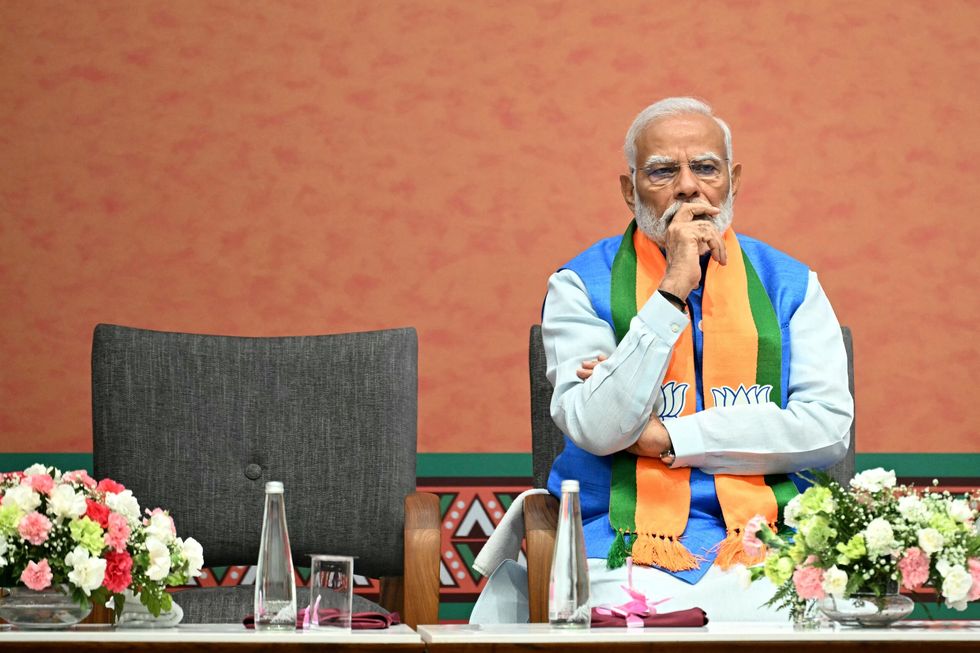THAT pejorative word “supermajority” has cropped up again.
First, it was in relation to Narendra Modi’s Bharatiya Janata Party (BJP) getting 400 seats in the Indian Lok Sabha [lower house of parliament] of 543. Now, it’s about Sir Keir Starmer’s Labour party getting 400 seats in the 650-member Commons.
The inference is the same. In a democracy, it is dangerous for a party to get too big a majority.
With just a couple of weeks left before the general election here on July 4, British Asians should seriously consider the consequences of a Labour government with a supermajority.

Amid a forecast that the Tories will be reduced to 57 seats (down from 345), the defence secretary, Grant Shapps, told a radio station: “If you want to make sure that in this next government, whoever forms it that there is a proper system of accountability, then we would argue that you don’t want to have somebody receive a supermajority.”
He warned that “if that power was unchecked would be very bad news for people in this country. A blank cheque approach, allowing someone to do anything they wanted, particularly when their particular set of plans are so vague.”
He went on: “No one has cast a vote... we are fighting for every single seat in this country, the polls have been wrong before. But it’s perfectly legitimate to say that the country does not function well when you get majorities of the size of Blair’s or even bigger.”
After Starmer’s pro-Israeli and anti-Palestinian stance on Gaza, British Muslims, notably Pakistani-origin voters, will have to make up their minds whether the Labour leader is the right person to be prime minister.
After 14 years of Conservative government, especially when people like Liz Truss have been in charge, it is easy to understand why people want a breath of fresh air.
It is disappointing the extent to which Rishi Sunak has pandered to the right wing of the Conservative party. Again, it is up to British Indians to decide if their future and that of their children will be improved by 20 years of Labour governments – because that is what a Starmer supermajority might mean.
If VAT is put on private schools, many parents will be forced to move their children to the state sector. The shadow attorney general, Emily Thornberry, has admitted that “it would be fine if we have to, in the short term, have larger classes”.
No one really thinks destroying private schools will help the state sector but the politics of envy does have electoral appeal.
As Labour leader, Starmer has so far not bothered to visit India, which, as the Grant Thornton’s Tracker report shows, is one of the biggest investors in the UK economy. He has kept British Asians, especially Indians, out of his top team.
Back in India, the ruling BJP set its sights on a supermajority with more than 400 seats – “ab kee bar, 400 paar”. But even those who wanted Modi back were not keen to give him a supermajority. The BJP only won 240 seats, enough to form a government with its allies.
Before the results were announced, the Daily Telegraph reported: “India’s Narendra Modi is on course to win a ‘super majority’, early exit polls showed, stoking fears he will use sweeping powers to change the constitution amid a rising tide of nationalism. If that happens, he would have the two-thirds majority in parliament to change the constitution, which his opponents say he plans to do. Right-wing Hindus have been openly campaigning to transform India from a secular state into a Hindu one, or Hindu Rashtra.”
In Britain, an article in the Spectator discussed “the danger of a Labour supermajority”.

“Voting Reform UK will, in the Westminster model, give Nigel Farage three MPs at most – but could turn a Starmer majority into a supermajority, with sweeping powers to do whatever it likes without any serious concern about parliamentary opposition. If Starmer gets such power, what is likely to happen?
“One of the popular complaints in Labour is that, when the left split in 1981, (Margaret) Thatcher took the opportunity to reshape Britain in a way that was more favourable to Conservatives. Industries were privatised, taxes lowered, council houses sold and television and airlines deregulated.
“It was an agenda to advance individual liberty delivered so successfully that Labour’s collectivism became a thing of the past. Starmer may soon have the power to reverse all that.”
A hung parliament may not be a bad result.






 Nigel Farage
Nigel Farage Rupert LoweGetty Images
Rupert LoweGetty Images










 Rajan offers the pind daan in honour of his father and ancestors
Rajan offers the pind daan in honour of his father and ancestors 


 LONDON, ENGLAND - JUNE 22: Baroness Floella Benjamin speaks during the unveiling of the National Windrush Monument at Waterloo Station on June 22, 2022 in London, England. The photograph in the background is by Howard Grey. (Photo by John Sibley - WPA Pool/Getty Images)
LONDON, ENGLAND - JUNE 22: Baroness Floella Benjamin speaks during the unveiling of the National Windrush Monument at Waterloo Station on June 22, 2022 in London, England. The photograph in the background is by Howard Grey. (Photo by John Sibley - WPA Pool/Getty Images)
 Ed Sheeran and Arijit Singh
Ed Sheeran and Arijit Singh Aziz Ansari’s Hollywood comedy ‘Good Fortune’
Aziz Ansari’s Hollywood comedy ‘Good Fortune’ Punjabi cinema’s power-packed star cast returns in ‘Sarbala Ji’
Punjabi cinema’s power-packed star cast returns in ‘Sarbala Ji’ Mahira Khan
Mahira Khan ‘Housefull 5’ proves Bollywood is trolling its own audience
‘Housefull 5’ proves Bollywood is trolling its own audience Brilliant indie film ‘Chidiya’
Brilliant indie film ‘Chidiya’  John Abraham
John Abraham Hina Khan and her long-term partner Rocky Jaiswal
Hina Khan and her long-term partner Rocky Jaiswal  Shanaya Kapoor's troubled debut
Shanaya Kapoor's troubled debut Sana Yousuf
Sana Yousuf